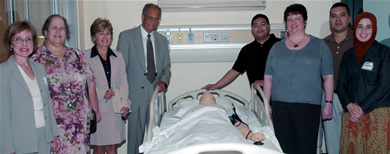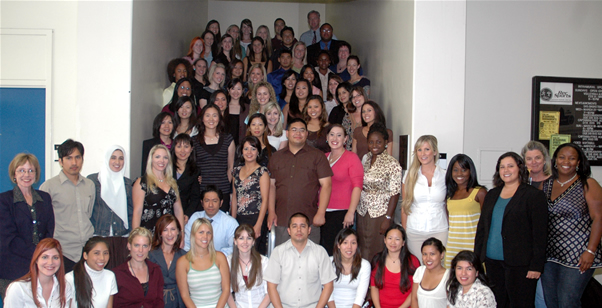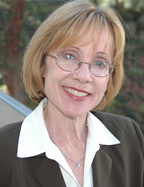Short Circuiting the Nursing Shortage
Students Begin Studies In New “Entry-Level” Master’s Degree in Nursing
August 29, 2007
By Mimi Ko Cruz
With a new $1.6 million nursing simulation lab where they can practice their newly learned skills, 65 graduate students have commenced studies in the university's new advanced degree in nursing program.
Designed for students with non-nursing undergraduate degrees, the “entry-level” master's program provides coursework and clinical experiences needed to qualify for licensure as a registered nurse (RN) and awards a master of science degree in nursing (MSN).
Participating students in the accelerated track program are taking prerequisite courses in anatomy, physiology, microbiology, chemistry, English, speech, statistics, critical thinking, psychology and sociology or cultural anthropology, said Mary Wickman, program director.
Previously, all nursing students pursuing bachelor or master's degrees from Cal State Fullerton had to possess RN licensure, said Wickman.
At a recent orientation, President Milton A. Gordon offered good wishes to the program's inaugural class. “Don’t let any of those mannequins die,” he joked.
On a more serious note, Gordon added, “with the shortage that exists in nursing, this new program is an incredible way to address the country’s health needs.”

Campus educators and students recently explored the new nursing facility
in the Kinesiology and Health Science Building. The simulation lab will
be used by 65 graduate students in the new "entry-level" master's
degree in nursing program. Pictured are, from left, Mary Wickman, director
of the new program; Paula Herberg, professor of nursing; Roberta Rikli,
dean of the College of Health and Human Development; President Milton
A. Gordon; and students Fernando Serrano, Anne Judson, Albert Romo and
Amy El-Akabawi.
"This accelerated, or innovative, RN to MSN program should be beneficial not only to students but also to the community at large, especially as baby boomers are aging and demanding more health care services," said Roberta Rikli, dean of the College of Health and Human Development.
"The state of California and Orange County are in the midst of a severe nursing shortage," Wickman said. "Conservative estimates suggest that Orange County will need 800 new RNs per year for the next 10 years. Our accelerated MSN program will produce advanced degree graduates who are prepared to meet the community’s need for nurses who are able to assume clinical leadership in all health care settings and are prepared to implement evidence-based research, outcomes-based practice and quality improvement strategies."
CSUF's accelerated pre-licensure program is the first of its kind offered in any accredited college or university in Orange County, Wickman said. Development of a pre-licensure baccalaureate degree in nursing also is in the works.
It should take the 65 graduate students 18 months to complete the pre-licensure course work and another 15 to 18 months to complete the MSN degree, said Wickman.
The new lab features a hospital-like setting and is fitted with nearly $700,000 worth of equipment including beds, wheelchairs, infant-care stations, patient mannequins, computer programs and audiovisual materials that allow students to practice nursing skills. The lab has a lobby, an 11-bed hospital wing with emergency, surgical and pediatric rooms, a patient exam room, a 30-seat classroom, a 6-seat study room and a conference room.
Barbara Doyer, lecturer in nursing and the lab's coordinator, said students have begun practicing basic skills such as bathing patients and bed-making, and will soon practice giving the mannequins injections and IV (intravenous) therapy.
"When I was a nursing student, I had to practice these skills on an orange," Doyer said. "Our students are getting a state-of-the-art lab where they can practice in a safe environment."
"I chose this program because it is for people who can get their master's in nursing who have bachelor's degrees in something else," said Connie Kim, who earned her undergraduate degree in human development from UC Davis. "This program can equip me to become a great nurse. I want to become a nurse because I want to help people and make a difference in people's lives."
Joining the new students this fall are nine new full-time nursing faculty members: Doyer, associate professor Quannetta Edwards, assistant professors Vanessa Miller and Rebecca Otten, and lecturers Nahid Ghazaee, Judith Hervey, Judith Kerns and Laurie Lang.


